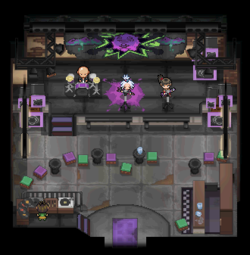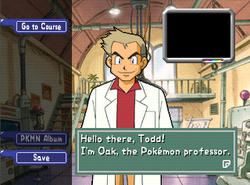Voice acting in the Pokémon games

|
This article is intended to be moved into one of Bulbapedia's main content spaces. Be mindful that it is still part of a personal userspace. Any content changes should be brought up on the talk page for this article. |
Voice acting is when the voice of an actor, often referred to as a voice actor, is used to give voice to characters or provide narration. Some Pokémon games have full lines of recorded dialogue, such as Detective Pikachu, while others, such as the core series games, use voice acting more sparingly. Characters sometimes have voices that were created using voice samples that were synthesized to generate new speech or vocalizations.
In the core series games
The core series games have minimal voice acting, but occasionally feature brief vocals.
- In Pokémon Yellow and from Generation VI to Brilliant Diamond and Shining Pearl, Pikachu uses its cry from the anime, as voiced by Ikue Otani.
- From Pokémon: Let's Go, Pikachu! and Let's Go, Eevee! to Brilliant Diamond and Shining Pearl, Eevee also uses it cry from the anime, as voiced by Aoi Yūki.
- In Pokémon Black and White, the Village Bridge theme has synthesized beatboxing and enka vocal samples that can be added to the background track by speaking to the NPCs Russo (Japanese: ガッチー Gatchī) and Koontz (Japanese: れいぞう Reizō), respectively, implying that the NPCs themselves are singing their respective parts.
- In Pokémon Black 2 and White 2:
- The background music for the Virbank Gym uses synthesized vocal samples that spell out the word "Pokémon", implied to be sung by Roxie and Nicky.
- The background music for the Nimbasa Gym uses synthesized vocal samples that sing the phrases "Give me what I need" and "Are you ready?". The music and vocals seem to play as part of Elesa's performance, though the singer is unknown.
- Some of the Pokéstar Studios opponents use synthesized vocal samples in their cries, namely Brycen-Man, Black Belt, Monica, F-00 (both forms), Black Door, and White Door.
- In Pokémon Sword and Shield:
- The Gym battle theme has vocals of the crowd singing along with the song that are added after the Gym Leader Dynamaxes or Gigantamaxes a Pokémon.
- Gigantamax Pikachu and Gigantamax Eevee use vocals, similar to their standard forms. Gigantamax Meowth also uses vocals, though its standard form does not.
- In Pokémon Legends: Arceus, Rei (voiced by Tatsuya Kotono) and Akari (voiced by Tamaki Fujii) make various vocalizations and grunts during gameplay, such as when throwing a Poké Ball or taking damage.
- In Pokémon Scarlet and Violet:
- On the title screen, the voices of students talking and playing can be heard. A different, more energetic voice track can be heard after the game's story has been completed.
- The Gym battle theme has vocals of the crowd singing along with the song that are added after the Gym Leader Terastallizes a Pokémon.
In the side series games
Some side series games feature voice acting, most prominently in the form of an in-battle announcer.
- In Pokémon Stadium and Pokémon Stadium 2, the starter Pikachu from Pokémon Yellow uses its cry from the anime, as voiced by Ikue Otani. All other Pikachu use a standard cry based on the species' core series cry. During battles, the announcer (Ted LewisEN/Kōichi HasebeJP) combines various voice clip segments to describe the combatants' moves and current condition.
- In Pokémon Battle Revolution, the announcer (Rodger ParsonsEN/Kenyu HoriuchiJP) once again combines voice clips to narrate the play-by-play of battles.
In the spin-off games
Several of the spin-off games feature voice acting. This can vary from minor vocal parts to full scripts of spoken dialogue.
- In Pokémon Snap, Todd Snap and Professor Oak use short voice lines by their original English anime voice actors, Carter Cathcart and Stan Hart, respectively. While many Pokémon make generic animal sounds or other noises fitting their species, others have voice clips using their anime voices, such as Pikachu and Meowth. A Jigglypuff also sings the same song that the recurring Jigglypuff sings in the anime.
- In Pokémon Puzzle League, the introductory cutscene is fully voiced, and short voice clips from various anime characters will play when navigating menus. During battles, the participating Pokémon will also occasionally say their cry from the anime, while human characters and Team Rocket's Meowth may chime in about the player's performance. Opponents will also say a short voice clip before and after battles.
- In Hey You, Pikachu!, all Pokémon use their cry from the anime.
- In Pokémon Channel, all Pokémon use their cry from the anime. Channel host Pokémon as well as Pikachu speak extensively, though in Pokémon language. Meowth is an exception, as it speaks in full human-language sentences.
- In PokéPark Wii: Pikachu's Adventure and PokéPark 2: Wonders Beyond, every Pokémon uses their cry from the anime. Among these is Porygon-Z, who received new voice acting, as it previously did not speak in the anime.
- In Pokken Tournament, all human characters use full voice acting for dialogue in and out of combat. All Battle Pokémon as well as Support Pokémon also have voice acting for numerous actions in combat. Pikachu and Pikachu Libre use voice lines by Ikue Otani.
- In Pokémon GO, Pikachu uses voice lines by Ikue Otani.
- In Detective Pikachu, all cutscenes feature full voice acting. While a Pikachu with Ikue Otani's voice does make a cameo, the titular Detective Pikachu is instead voiced by Kaiji Tang.
- In Pokémon Masters EX:
- All Trainers except for Scottie and Bettie have various voice lines for specific actions both in and out of battle, such as sending in a Pokémon, directing a Pokémon move, receiving an upgrade, or giving the player an item.
- Trainers also have short voice clips used in story scenes, though these generally only express the character's sentiment, rather than matching the displayed dialogue text.
- Scottie/Bettie's Pikachu, Sygna Suit Thunderbolt Red's Pikachu, and Ash's Pikachu all use lines voiced by Ikue Otani, with each Pikachu having its own unique voice line.
- Leaf's Eevee uses voice lines by Aoi Yūki.
- In New Pokémon Snap, a handful of cutscenes and tutorials feature fully voiced lines by the characters, but short voice clips are used otherwise. Pikachu and Eevee use voice lines by Ikue Otani and Aoi Yūki, respectively, while most other Pokémon use generic grunt sounds to respond to certain actions, such as getting hit by a Fluffruit.
Background vocals
Several games feature vocals that are part of the background music or ambience.
Core series
- In Pokémon Black and White, Ghetsis's battle theme includes synthesized vocal samples that chant his name.
- In Pokémon Black 2 and White 2:
- The Humilau Gym music has soft harmonic synthesized backing vocals.
- Colress's battle theme uses synthesized vocal samples that count down from five to one.
- Ghetsis's theme still uses vocal samples chanting his name, but is now more distorted.
- The Kyurem fusion theme uses a synthesized choir sample.
- Musical: Charming Munna has audible synthesized vocal samples that repeat phrases such as "Yeah", "That's right", and "メロメロ ムンナ Meromero Munna".
- Final Battle! World Championships uses a synthesized choir sample.
- In Pokémon Sun and Moon:
- Chanting vocals are used in the music that plays during the video call between Professor Kukui and the player at the beginning of the game. These vocals are used once again in the credits.
- The music played before freeze-frames during Kiawe's Trial also uses chanting.
- Chanting and harmonic vocals are used in the Champion battle theme.
- The guardian deities' battle theme features heavy vocals, including chants in Hawaiian.
- Vocals that say the words "Team Skull" are used in various music tracks associated with Team Skull.
- Operatic vocals are used in Lusamine's battle theme.
- In Pokémon Ultra Sun and Ultra Moon:
- The music played during Kukui's video call and the credits is different from Sun and Moon's version; however, the vocals are the same.
- Ultra Jungle uses vocals in its background music.
- Ghetsis and Colress's themes makes a return, with the same vocals.
- In Pokémon Sword and Shield:
- The Slumbering Weald music includes harmonic backing vocals that can be heard supporting the main melodic howling.
- Marnie and Piers' battle themes include chanting vocals.
- Hop and Marnie's themes during the final tournament as well as Leon's Champion theme include audience cheering.
- Rose's final battle theme has operatic vocals.
- In Pokémon Scarlet and Violet:
- The background music in Area Zero has prominent vocals.
- The song Celestial by Ed Sheeran plays during the end credits.
Spin-off games
- In Pokémon Masters EX, Ghetsis's battle theme and the Galar Gym battle theme retain the vocals from the originals. However, several songs such as Lusamine's or Leon's battle themes no longer have vocals.
Trivia
- Giratina's cry uses a voice sample of people screaming.

